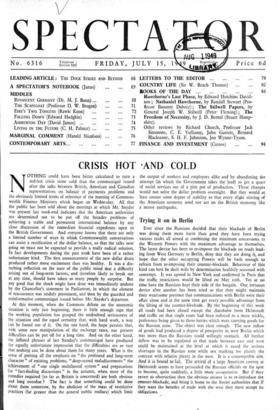CRISIS HOT AND COLD
NOTHING could have been better calculated to turn a red-hot crisis stone cold than the communiqué issued after the talks between British, American and Canadian representatives on balance of payments problems and the obviously limited terms of reference of the meeting of Common- wealth Finance Ministers which began on Wednesday. All that the public has been told about the meetings at which Mr. Snyder was present last week-end indicates that the American authorities are determined not to be put off the broader problems of achieving a stable and permanent international balance by any close discussion of the immediate financial expedients open to the British Government. And everyone knows that there are only a limited number of ways in which Commonwealth conversations can assist a rectification of the dollar balance, so that the talks now going on must not be expected to provide a really radical solution. In fact developments during the past week have been of a rather unfortunate kind. The first announcement of the new dollar drain produced rather more excitement than was healthy. It was a dis- turbing reflection on the state of the public mind that a difficulty arising out of long-term factors, and therefore likely to break out at any time, should have taken so many people by surprise. But any good that the shock might have done was immediately undone by the Chancellor's statement in Parliament, in which the element of reassurance was unduly prominent, and then by the guarded and uninformative communiqué issued before Mr. Snyder's departure.
At this moment, when the Commons debate on the economic situation is only just beginning, there is little enough sign that the working population has grasped the undoubted seriousness of the situation and the equal certainty that, with hard work, a way can be found out of it. On the one hand, the hope persists that, with some new manipulation of the exchange rates, our present difficulties can be put off for a long time. And on the other hand, the inflated phrases of last Sunday's communiqué have produced the equally unfortunate impression that the difficulties are so vast that nothing can be done about them for many years. What is the sense of putting all the emphasis on "the profound and long-term character" of existing problems, "deep-seated maladjustments" the achievement of "one single multilateral system" and preparations for "fact-finding discussions" in the autumn, when most of the remedies required (so far as Britain is concerned) are both obvious and long overdue ? The fact is that something could be done about them tomorrow, by the abolition of the mass of restrictive Practices (far greater than the general public realises) which limit the output of workers and employers alike and by abandoning the attempt (in which the Government takes the lead) to get a quart of social services out of a pint pot of production. These changes would not solve the dollar problem overnight. But they would at least ensure some degree of stability so that every slight stirring of the American economy need not act on the British economy like a minor earthquake.


































